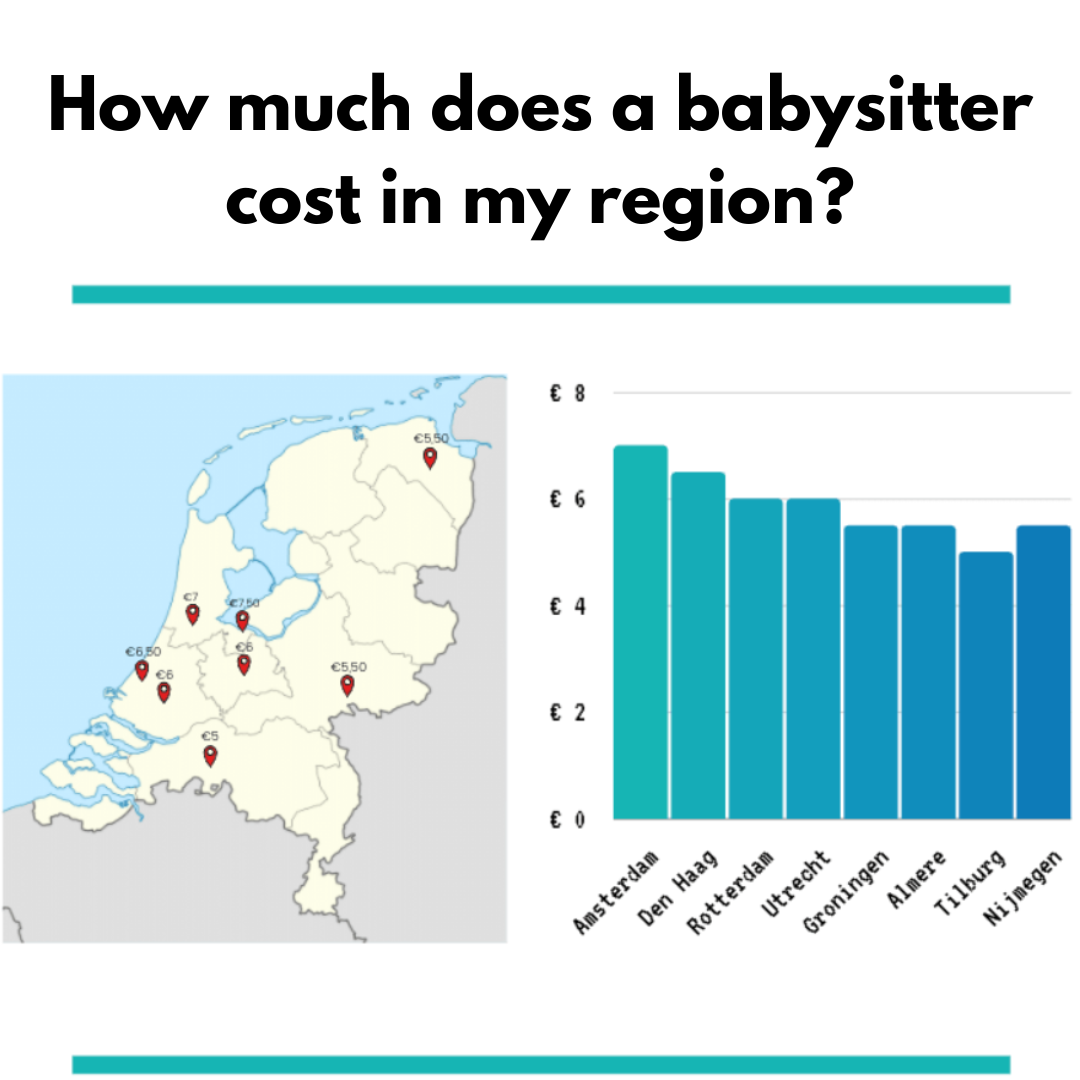Shocked by your babysitter’s rates? You’re not alone.
From teen sitters to seasoned pros, babysitting costs vary wildly across the country. But what really drives these differences? Age, location, experience, or education?
Uncover the real factors behind babysitting rates and learn what you should actually be paying per hour. Your wallet (and your sitter) will thank you.
What is the Babysitter Hourly Rate Based On?
Dad is seriously confused about the hourly rate for babysitting?! Stress less and let me break it to you: There’s no “one-size-fits-all” rate for babysitting.
The good news is that there are many factors you can consider in order to find a fair price. A great starting point is the minimum (youth) wage, and from there, you can adjust the hourly rate depending on your family’s needs and the babysitter’s experience.
Things to Consider When Hiring a Babysitter and What You Can Expect to Pay
1. Safety First! Does the Babysitter Have a VOG (Verklaring Omtrent Gedrag)?
A what?! The VOG is a background check conducted by the Dutch Ministry of Justice. It is mandatory for anyone working in childcare, education, or other sensitive roles where they are responsible for the well-being of children.
You definitely want to know that you’re leaving your little ones with someone safe, not someone who secretly channels their inner Ms. Trunchbull! A VOG gives you peace of mind that your babysitter has passed all the checks and isn’t hiding any scary surprises under their nanny apron.
It’s worth investing in someone with a VOG. After all, you’d much rather hire a Mary Poppins than risk a babysitter who might think throwing kids in the “chokey” is part of the job description!
2. How Much Experience Does the Babysitter Have?
It makes sense that someone who has a lot of experience as a sitter charges more than someone who is just starting to babysit. This could have to do with age… or the number of times the sitter has handled everything from tantrums to stalling bedtime like a pro.
You might pay a bit more for their expertise, but rest assured an experienced babysitter will never call you home early from your date night and will always be able to keep the chaos in check.
These higher hourly rates will be totally worth it!
3. Does the Babysitter Have a Diploma?
In the Netherlands, there are several studies that prepare individuals for careers in childcare, education, and early childhood development. Does your babysitter hold a childcare certificate?
That’s great! At this level your babysitter acquires a professional level of practical and theoretical knowledge of childcare, child development, and educational activities.
A babysitter who has undergone training will no doubt charge more than someone without certification.
4. Does the Babysitter Have Their First Aid Certificate?
When you’re caring for kids, safety comes first. Imagine this, the kids are playing happily when suddenly one takes a tumble and scrapes their knee. In those crucial moments, knowing exactly what to do can make all the difference.
Being trained to handle minor accidents or even more serious emergencies gives parents peace of mind. If your babysitter holds a first aid certificate, it is definitely a bonus which will increase the hourly rate.
5. What Are Your Child Care Needs Regarding the Number of Children?
Most families in the Netherlands tend to have one or two children, families with three or more children are less common. If you’ve got a lively bunch where group dynamics come into play, you might want to sweeten the deal!
6. How Much Can the Sitter Charge for Babysitting When Looking After a Baby Compared to an Older Child?
Some parents might argue ‘the baby is easy and is just happy to play with their blocks, I shouldn’t need to pay a higher cost for that’.
The answer is that the babysitter has to be very vigilant during this time due to the extra care such as bottle feeding, diaper changing and ensuring constant supervision.
In contrast, looking after an older child might involve less intensive care, especially if the child is more independent and capable of handling certain tasks on their own.
7. What About Gas Money or Travel Allowance?
Some nannies travel by public transport therefore has an hourly rate €0.50 to €1.00 higher to cover travel expenses. Not all babysitters charge a separate travel allowance for this, make sure you discuss this before their paid time.

Extra Duties That May Affect Your Hourly Babysitter Rate?
- Do your children require homework help? Does the sitter need to drive children to soccer practice? Do they have to care for a larger group for example at a wedding? Or is an additional child coming on a play date? These things are outside the usual rate and may cost you an extra dollar.
- Perhaps the babysitter needs to offer specialized care for children with special needs, that may cost you a higher rate due to the carer’s additional responsibilities.
- If a babysitter is willing to do more work around the setting like cooking or cleaning, the babysitter will also charge more money which may affect the average hourly rate.
Does it Matter If the Children Are Awake or Asleep When the babysitter is There?
Daytime and evening rates are taken into account. When the children are in bed, the evening rate takes effect. You could pay on average €2.00 less when the children are asleep. The babysitter can then do something for themselves, such as study.
Babysitting is an ideal part-time job for students, especially when they can study in the evenings. However, the hourly rate is usually lower when the kids are asleep, as it is less hands-on.
What About for Longer Lengths of Time?
If the babysitter is asked to stay up until after midnight, stay overnight, attend for an entire weekend or to come on a holiday, the babysitter will also charge more per hour including sleeping hours.
If you are really in need for long care within the family home and you don’t want to keep your eye on the clock, many parents also consider hosting an au pair.
Wrapping It All Up: Finding the Right Babysitter Hourly Rate Is All About Balance!
As mentioned earlier, babysitting rates in the Netherlands depend on various factors like experience, qualifications, the age or number of children being cared for and any additional responsibilities when deciding what to pay.
By balancing these factors, both parents and babysitters can agree on a fair rate that ensures quality care for the children.
Now that we have explored many of the other factors, let’s get down to what to expect to pay for the job. In the coming section we will discuss why it is important to consider the going rate in your region or city.
What is Your Location?
Location plays a big role in determining babysitting rates. A nanny in Amsterdam will typically charge more than one in Oosterhout, largely because living costs in Amsterdam are higher.
Additionally, rates are influenced by supply and demand. For example, in Nijmegen, there are plenty of babysitters available, but fewer jobs compared to in the suburbs, which can lead to lower rates.

Top Cities, Which City Is the Cheapest?
Babysitting rates can vary significantly across the Netherlands, with some cities charging much lower fees than others. For example, cities like Groningen and Leeuwarden tend to have the most affordable rates.
On the other hand, in student cities like Amsterdam, Delft, and Leiden, rates are more balanced compared to areas like Haarlem and the Gooi, which are known for their relatively high babysitting fees.
So, what does the average hourly wage look like by age per city?
| Cities | Rate for Children asleep | Rate Children awake |
|---|---|---|
| Nanny in Alkmaar | €5,50 | €9,50 |
| Nanny in Almere | €4,50 | €8,50 |
| Nanny in Alphen aan den Rijn | €4,00 | €8,00 |
| Nanny in Amersfoort | €6,00 | €10,00 |
| Nanny in Amsterdam | €7,00 | €11,00 |
| Nanny in Apeldoorn | €6,00 | €10,00 |
| Nanny in Arnhem | €5,50 | €9,50 |
| Nanny in Breda | €5,00 | €9,00 |
| Nanny in Delft | €6,00 | €10,00 |
| Nanny in Den Haag | €6,00 | €10,00 |
| Nanny in Dordrecht | €5,50 | €9,50 |
| Nanny in Eindhoven | €6,00 | €10,00 |
| Nanny in Emmen | €5,50 | €9,50 |
What Does a Nanny Earn on Average by Age?
Roughly speaking, the distribution of average salaries for nannies can be seen in the table below
| Age | Rate for children awake | Rate for children asleep |
|---|---|---|
| 14 year old | 3,50 per hour | 3 euro per hour |
| 15 year old | 4 euro per hour | 4 euro per hour |
| 16 year old | 5 euro per hour | 5 euro per hour |
| 17 year old | 6 euro per hour | 6 euro per hour |
| 18 year old | 6 to 8 euro per hour | 5 to 6,50 euro per hour |
| 19 – 24 year old | 7 to 12,50 euro per hour | 7 to 8 euro per hour |
| 25+ year old | 12,50 euro per hour | 8 to 9 euro per hour |
| 18+ with education and childcare allowance | 15 – 20 euro per hour | 7 to 9 euro per hour |
How to Determine the Right Hourly Babysitter Rate for Your Family
It’s important to discuss pay with your new babysitter during the initial meeting, but keep in mind that they may be young and inexperienced when it comes to negotiations. This can be a nerve-wrecking conversation for them, especially if it’s their first time discussing payment.
When searching for nanny services, I hope this blog has given you a better understanding of what you can expect to be charged for babysitting in the Netherlands. Whether you’re paying a flat rate that aligns with the national average, or hiring a more experienced sitter for extra hours, I hope you feel more prepared to navigate higher rates to suit your individual situation.
Remember that finding the right sitter is not just about the cost, but also about ensuring a safe, nurturing environment for your children. By balancing the hourly rate with the quality of care and experience, you can ensure your children have the best possible babysitting experience while feeling confident in your decision. At Nina Care, we understand the importance of finding someone you can trust. That’s why all our babysitters are thoroughly screened and vetted, ensuring they are reliable, experienced, and caring. Let us help you find the perfect babysitter, so you can have peace of mind knowing your children are in safe hands.


